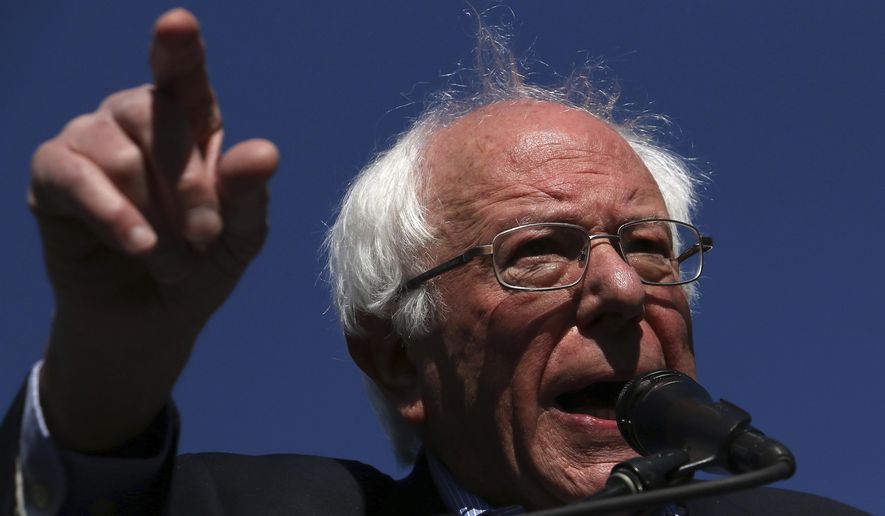Capitol Hill progressives said Tuesday they’ve crafted legislation that compels drug companies to charge Americans no more than the median price for prescriptions in Canada, the U.K., France, Germany and Japan.
Sen. Bernard Sanders of Vermont and Rep. Ro Khanna of California said under their bill, which will drop in the new Congress, the federal government must approve generic versions of those drugs if companies refuse to lower prices, regardless of patents or exclusivity rights.
“No other country allows pharmaceutical companies to charge any price they want for any reason they want,” Mr. Sanders said. “Somebody in America today can walk into a pharmacy and find out that the medicine they have been using for years can double, triple or quadruple literally overnight. That needs to change.”
Under the plan, the Health and Human Services Department secretary would pinpoint excessively priced drugs using a set of criteria, such as the number of affected patients and whether cost is a barrier to access, before comparing U.S. prices to those abroad.
The generic entrant would have to pay a “reasonable royalty” to the holder of the original patent, but not one so high it forces the generic to be sold at bloated prices, too.
If the plan became law, the cost of brand-name drugs would drop by more than 40 percent, sponsors estimated.
They also said it would have popular support, pointing to polling that found eight in 10 Americans think drug prices are unreasonable.
The bill, which effectively threatens drug makers’ monopoly status, is an aggressive marker ahead of the new Congress.
Democrats who recaptured the House say they will try to work with President Trump, who also sees high drug costs as a major problem — putting pressure on Republicans who control the Senate and tend to resist government-driven steps to slash costs.
The Pharmaceutical Research and Manufacturers of America, a top lobbying group, blasted the Sanders proposal Monday an intrusive overreach into the competitive U.S. market.
“It would be unprecedented for the U.S. government to steal patents from biopharmaceutical innovators,” PhRMA spokeswoman Nicole Longo said. “No countries that are leaders in innovation have taken such drastic measures. Instead, Sen. Sanders and Rep. Khanna are proposing the United States copy the systems of countries like Ecuador, Egypt and Indonesia that have resorted to such anti-competitive measures with no evidence it helped patient access to medicines.”
A slew of progressive groups lined up on the other side, saying the bill would send a powerful message to Big Pharma.
“This bill would end Big Pharma ripoffs by relying on generic competition as the cure for brand name companies’ unconscionable pricing,” said Robert Weissman, president of Public Citizen, a consumer rights advocacy nonprofit.
The idea matches the spirit of Mr. Trump’s new plan to align the cost of doctor-administered drugs under Medicare to what other developed nations pay.
Mr. Trump says the plan to peg Medicare Part B prices to an “international pricing index” will correct a “rigged” system in which Americans effectively subsidize drug innovation and lower costs in other developed nations.
The payment experiment will be phased in beginning in late 2019 or 2020 and affect half of the country.
HHS responded to questions about the Sanders proposal indirectly on Monday, saying it’s willing to work with Congress while noting it’s already taken “bold actions” to deal with drug costs, including the International Pricing Index.
PhRMA doesn’t like that plan, either, saying patients in countries with government-set prices “wait years for new medicines and have far fewer treatment options.”
Mr. Sanders and Mr. Khanna say if anything, the international pricing index is too limited, because it won’t help the 150 million Americans who hold job-based insurance or those who are uninsured and pay cash for drugs.
They also said Mr. Trump’s wider strategy for slashing costs — outlined in May — doesn’t appear to be working, pointing to Pfizer’s decision to hike the prices of 41 drugs in January.
Earlier this year, Mr. Trump personally convinced Pfizer to delay planned price hikes, but the thaw appears to be over.
House Minority Leader Nancy Pelosi, the Californian fighting to regain the speaker’s gavel, said Democrats will revive their push to let Medicare negotiate down the cost of prescription drugs in the new Congress. Mr. Trump expressed support for the idea during the 2016 campaign but is not pursuing it now.
“We hope to get that done now because that is a big impact on America’s families’ budget,” Mrs. Pelosi said one day after the mid-term elections.
• Tom Howell Jr. can be reached at thowell@washingtontimes.com.




Please read our comment policy before commenting.